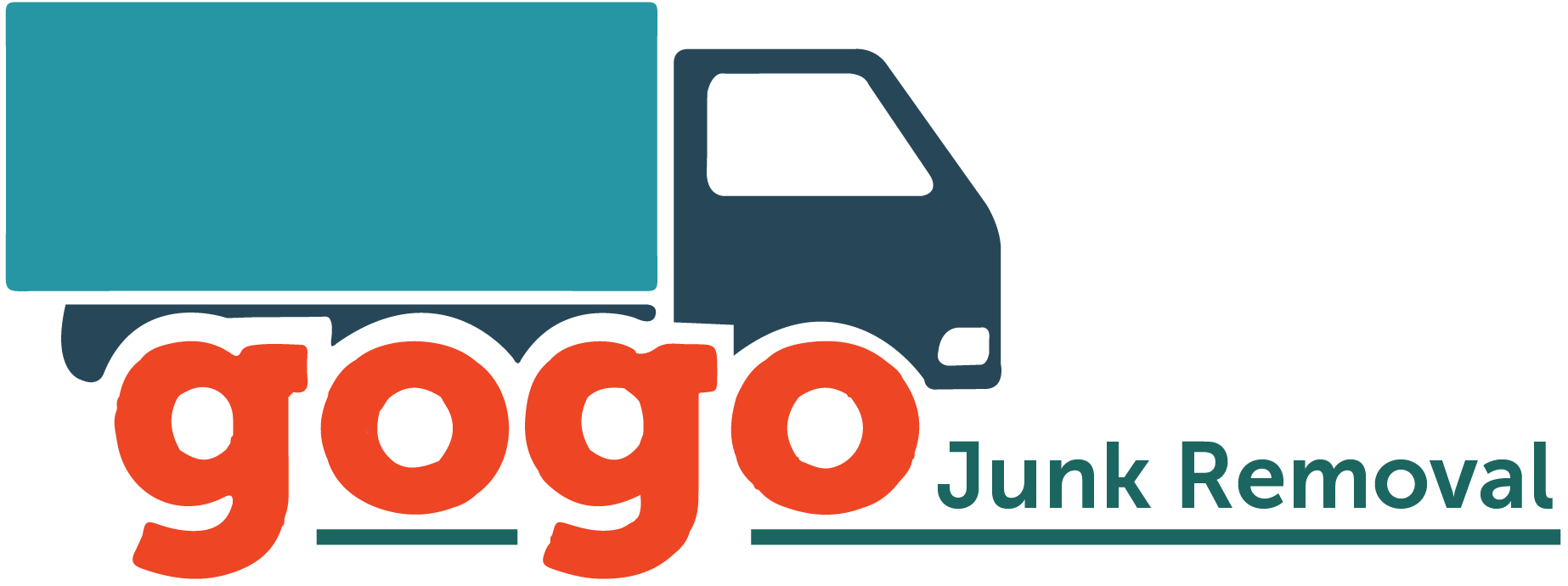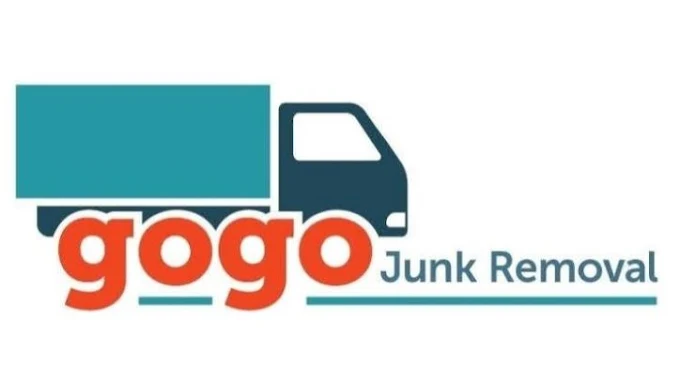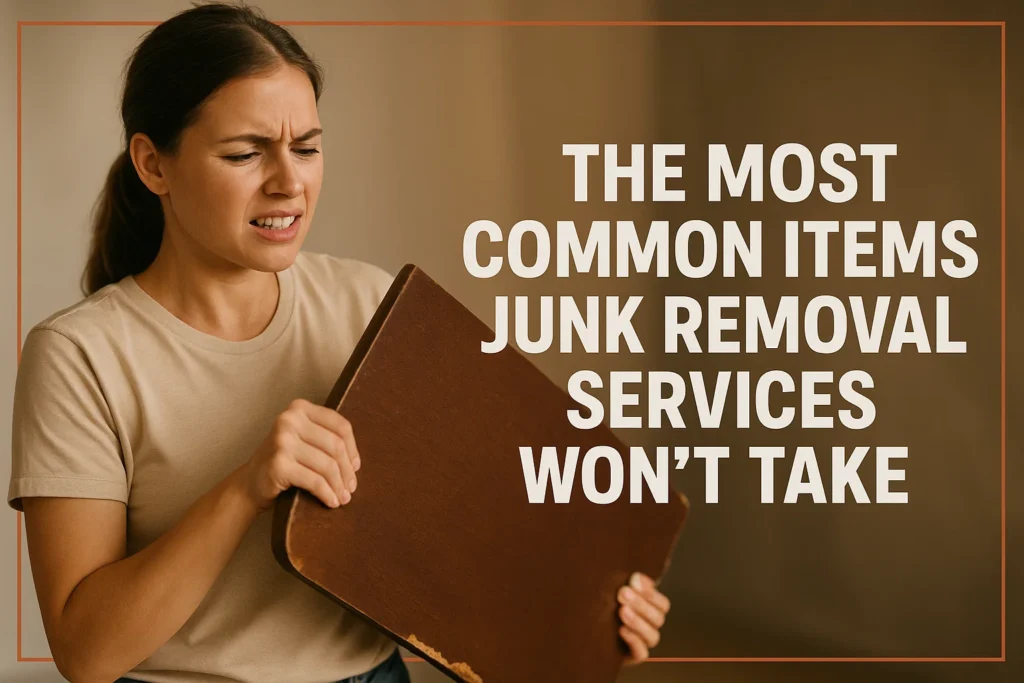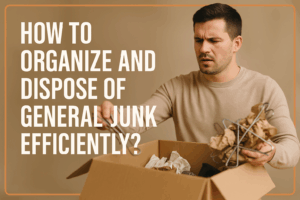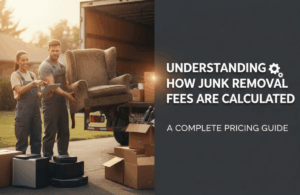Are you clearing out your house or doing a large renovation? Junk removal services might be a great idea that makes your clutter disappear in no time, but wait a minute! It is not always the case that all your unwanted items can be physically put into a truck and driven away. Most of the junk removal companies have certain restrictions in which they list the items they will not accept, and safety concerns, legal reasons, and environmental concerns are some of the reasons for the protective measures in place. Just imagine you have made a call for pick up and have found out your stuff includes banned materials that cannot be taken away.
To know the most common items that junk removal services will not take is a great way of saving time, money, and a headache or two. Don’t let this situation happen to you when you are unaware of the off-limits materials and you are stuck with hazardous waste. Learn what is prohibited so you can dispose of your junk in the right and safest way.
Understanding Junk Removal Service Limitations
Junk removal companies are a good way to get rid of the majority of the waste from the house or office in a simple and rapid way; hence, cleanup projects get easier in a big way. However, these companies do have significant limitations related to the issues of responsibility and regulations. The restrictions exist to protect not only the trucks but also the workers who handle the junk, and the environment from potential harm.
Some substances contain harmful qualities that call for the use of special handling or disposal methods. There are some types of waste that cause health problems, for example, biohazards or medical refuse that have to be managed in a very careful way.
Hazardous Materials and Chemicals
Among rejected substances, hazardous materials are at the top of the list, which a junk removal service will never consider. Such materials can cause serious harm to both humans and nature if their rightful handling is not observed.
Some of the most common hazardous items people find in their homes and which are refused are:
- Empty paint cans, thinners, and dyes
- Waste oil and car lubricants
- Poisonous baits, plant killers, and nitrogen compounds
- Battery
- LPG cylinders, cans for gasoline, and fire extinguishers
- Aerosol cans and inflammable products
- Materials that still contain asbestos
These are some of the items that require special disposal programs through local hazardous waste collection sites or recycling centers. Do not ever discharge hazardous liquids into sewers or throw them into normal garbage bins.
Medical and Biological Waste
Due to their contamination risk and potential to cause diseases, medical waste and biohazards have very strict rules for disposal. Generally, trash removal companies will not accept:
- Needles, syringes, or sharps containers
- Expired medications and pharmaceutical waste
- Blood, bodily fluids, or biological samples
- Items contaminated with medical waste or infectious materials
These materials need to be disposed of through medical waste programs or at pharmacies and hospitals with take-back options. Incorrect disposal of medical waste can lead to severe fines.
Large Appliances and Specialized Equipment
Most waste removal services indeed take household items; however, their situation is different when it comes to large appliances and specialized equipment. In most cases, these items need to be recycled or disposed of in a certified manner because of their components.
- The first group of refused items consists of those that contain refrigerants, such as refrigerators and freezers.
- Besides, air conditioners and dehumidifiers are also refused.
- Moreover, the list goes on with microwaves and electronic devices that contain hazardous materials, large medical equipment and devices, as well as industrial machines and heavy-duty equipment.
- There are some companies that provide appliance removal as a separate service, and they usually charge an additional recycling fee to cover the safe release of refrigerants.
Construction Debris and Hazardous Building Materials
One of the main sources of construction debris is the waste part, which contains materials that require a special type of disposal and possibly permits. Due to the size, weight, or content of hazardous materials, most junk removal companies do not take these materials.
Common rejected construction materials include:
- Roofing materials that still contain asbestos
- Lead-based paints and contaminated wood
- Concrete, bricks, and soil, if in large enough quantities
- Fiberglass-releasing insulation and drywall debris
- Tiles and floors that contain hazardous substances
Usually, contractors are the ones who transport these materials straight to the certified disposal or recycling facilities. In case a junk removal service is there to pick up construction waste, additional fees and preparation instructions should be considered.
Items Requiring Special Disposal or Recycling
Some common household items are categorized as those that need special recycling or disposal, which junk services cannot handle. This is done to make sure they do not damage the environment or can be used again safely.
Examples are:
- Tires and rubber materials
- Electronics consist of computers, TVs, and printers (e-waste)
- Fluorescent light bulbs and tubes that contain mercury
- Mattresses and box springs (because of the size and regulations)
- Car parts and tires
- Large amounts of yard waste or tree branches
Instead, many municipalities and private recyclers may have special drop-off or pick-up programs for these items.
What to Do With Items Junk Services Won’t Take
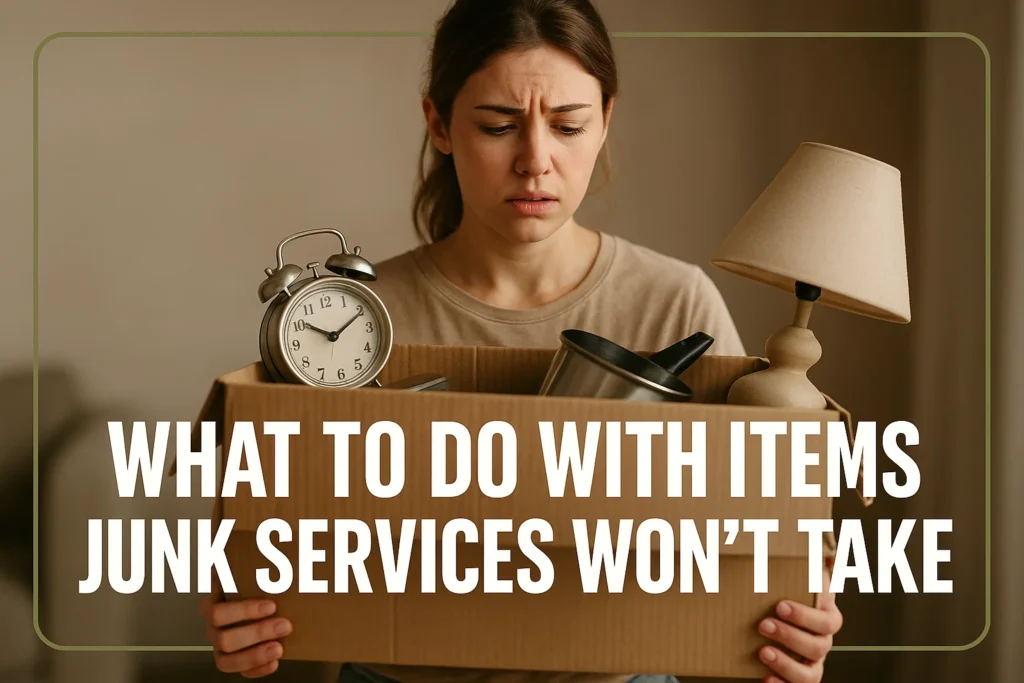
Not all unwanted items can be removed by a junk hauling company due to restrictions related to safety and the law. If there are things they do not want to take, there are ways of disposing of them properly and in a responsible manner at the same time.
Locate Hazardous Waste Collection Sites
Items like paint, oil, and chemicals that are refused by junk services call for the locating of hazardous waste collection centers near which these materials can be disposed of safely and legally.
Follow Local E-Waste Recycling Programs:
- E-waste, such as computers, fluorescent bulbs, and batteries, should be handled properly. Thus, it would be better if the community sets up programs to deal with such waste removal so that it can be recycled in the correct way.
- Go to Medicine Take-Back Programs with Expired Medications
- Expired or unused medications should never be disposed of with other garbage. They should be put in the take-back program of the pharmacy or the designated drop-off location, where they can be disposed of safely.
Contact Appliance Retailers or Recyclers
Large appliances that are not accepted by the junk removal service can be checked with appliance retailers or certified recycling centers. They always give you the possibility of exchanging, taking off, or simply getting rid of the product in accordance with the environmental regulations.
Schedule Bulk Trash Pickup Through Your City
Most towns and cities have days when you can get rid of your bulk garbage or recycle large/bulky items. You can contact the sanitation department of your city in order to organize the removal of objects such as old mattresses, furniture, or other large household items.
Hire Specialized Contractors for Construction Debris
Generally, construction materials and the emission of hazardous building waste must be handled by licensed contractors only, who are authorized to do so, and only in an environmentally safe way. Thus, by hiring the professionals, regulations and safety will surely be followed.
Donate Usable Items to Charities
Furniture, appliances, or electronics in your possession that are not obsolete and are still of good quality; then, donate them to charitable organizations or resale shops. This not only helps in waste management but also contributes to the development of your community.
Conclusion
It is essential to understand The Most Common Items Junk Removal Won’t take, in order to organize your junk removal properly and be certain that you will not be inconvenienced with some restrictions or fees. It is generally easy for the majority of waste services to deal with household waste and junk, however, in many cases, these services are not permitted to handle hazardous waste, medical materials, heavy appliances, construction debris, and special recycling items. By sorting your items and recognizing those that require special disposal, you will not only save time, but also make sure that all your unwanted materials are being disposed of in a safe and legal way.
For reliable and professional junk removal, trust Go Go Junk Removal Services to clear your space safely and responsibly. Contact us today to schedule your pickup.
FAQ’s
These are hazardous, flammable, or toxic things, and should be treated and disposed of specially so that they do not damage the workers and the environment.
No. The medical waste must be taken to a pharmacy or designated take-back collection that is specially intended to avoid contamination.
Unfortunately, based on the environmental regulations, several companies require an additional certification or pay a specific fee to be allowed to take away the appliances containing refrigerants.
Massive amounts and content of hazardous materials such as asbestos or lead paint, mean that they must be taken to licensed facilities that are particularly assigned to take them.
